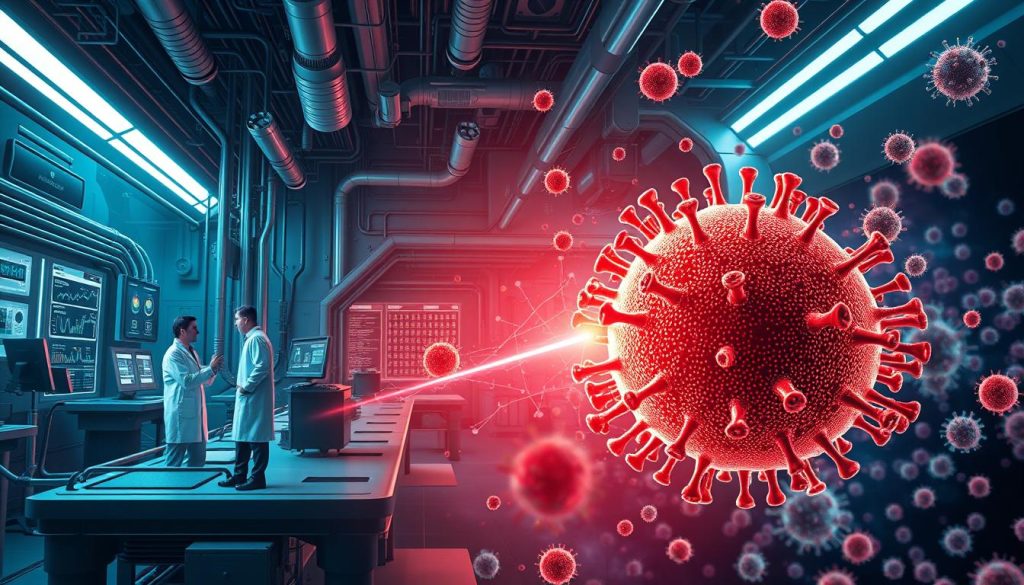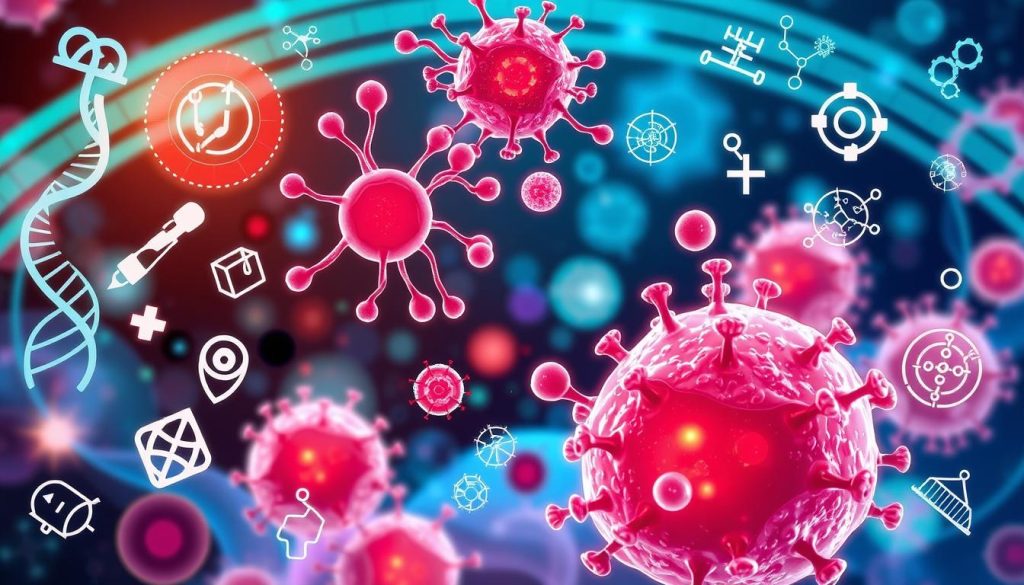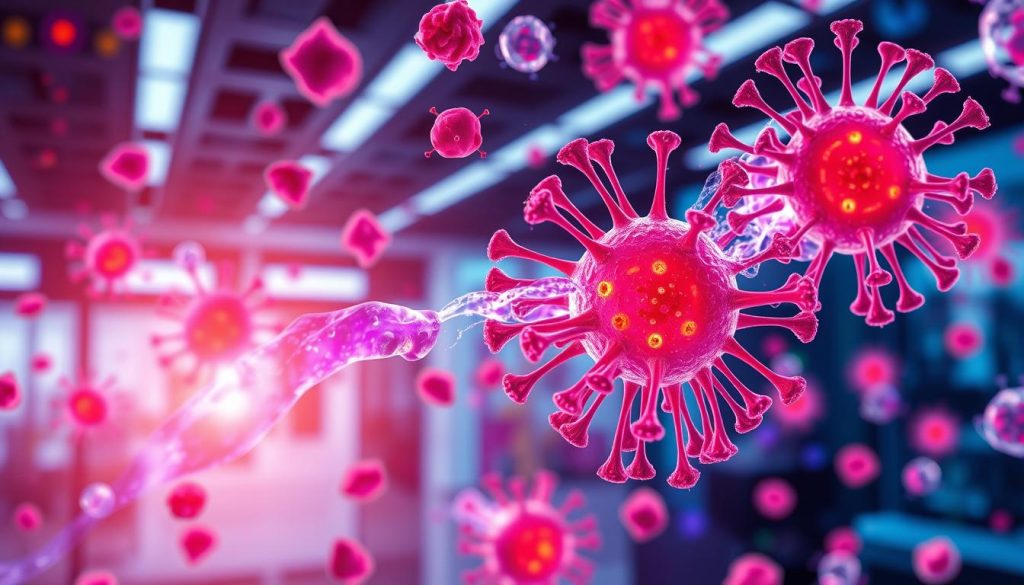In the world of cancer treatments, CAR T cell therapy is a big step forward. It uses a patient’s immune system to fight cancer. This gives new hope to those with tough cancers.
CAR T cell therapy changes a patient’s T cells to attack cancer. These cells are made to find and kill cancer cells. It’s a personalized way to fight cancer all over the body.
This therapy has changed how we treat cancer. It’s a new hope for those who have tried other treatments like chemo or surgery. As it gets better, CAR T cell therapy could help many more people with cancer.
Understanding CAR T Cell Therapy
CAR T cell therapy is a new way to fight cancer. It uses the body’s immune system to target and destroy cancer cells. This method involves changing a patient’s T cells to attack cancer with great precision.
What is CAR T Cell Therapy?
CAR T cell therapy, short for chimeric antigen receptor T cell therapy, is a new cancer treatment. It’s a type of gene-modified cell treatment and targeted cancer therapy. It changes a patient’s immune cells to fight specific cancer cells, helping those with certain blood cancers.
How CAR T Cell Therapy Works
The therapy involves several steps:
- T cells are taken from the patient’s blood through a process called leukapheresis.
- The T cells are then changed in a lab to have chimeric antigen receptors (CARs). These receptors help the T cells find and bind to cancer cells.
- The modified T cells are grown in the lab to make millions of cancer-fighting cells.
- The patient gets chemotherapy to prepare their body for the CAR T cells.
- The CAR T cells are given back to the patient. They then find and kill cancer cells with the targeted antigen.
The table below shows how CAR T cell therapy is different from traditional cancer treatments:
| Traditional Cancer Treatments | CAR T Cell Therapy |
|---|---|
| Non-specific, targeting both healthy and cancerous cells | Highly targeted, specific to cancer cells |
| Often has severe side effects | May have fewer side effects because it’s targeted |
| Limited effectiveness against some cancers | Shows promise in treating certain blood cancers |
“CAR T cell therapy is a big step forward in cancer treatment. It offers a personalized and targeted way to fight cancer.” – Dr. Sarah Thompson, oncologist
As research keeps going, CAR T cell therapy could change how we treat cancer. It gives hope to patients who have tried other treatments.
The Promise of CAR T Cell Therapy in Cancer Treatment
CAR T cell therapy is a new hope for cancer patients. It uses the body’s immune system to fight cancer. This makes it a targeted and personalized cancer treatment option.

This therapy works by changing T cells to attack cancer cells. T cells are a type of white blood cell. They are made to find and kill cancer cells, but not harm healthy cells.
It has shown great results in treating some blood cancers. For example, it has helped patients with acute lymphoblastic leukemia (ALL) and diffuse large B-cell lymphoma (DLBCL). These patients had tried other treatments without success.
| Cancer Type | Response Rate | Complete Remission Rate |
|---|---|---|
| ALL | 81-90% | 60-81% |
| DLBCL | 52-82% | 40-54% |
Now, scientists want to use it for solid tumors too. They are working to solve problems like different types of cancer cells and areas that stop the immune system.
“CAR T cell therapy represents a paradigm shift in cancer treatment, making it a highly personalized approach that empowers the patient’s own immune system to fight cancer.” – Dr. Steven Rosenberg, National Cancer Institute
As cancer immunology advances, CAR T cell therapy’s promise grows. More research and trials are needed. The goal is to make this therapy available to more patients who have tried everything else.
FDA-Approved CAR T Cell Therapies
CAR T cell therapy has changed the game for treating some blood cancers. The U.S. Food and Drug Administration (FDA) has approved four CAR T cell therapies. These treatments offer new hope for those who have tried everything else.
Kymriah (tisagenlecleucel)
Kymriah, made by Novartis, was the first CAR T cell therapy approved. It helps kids and young adults with B-cell acute lymphoblastic leukemia (ALL). It also helps adults with certain types of large B-cell lymphoma.
Yescarta (axicabtagene ciloleucel)
Yescarta, from Kite Pharma, is approved for adults with large B-cell lymphoma. This includes diffuse large B-cell lymphoma (DLBCL) and others.
Tecartus (brexucabtagene autoleucel)
Tecartus, also from Kite Pharma, is approved for adults with mantle cell lymphoma (MCL) and B-cell precursor ALL.
Breyanzi (lisocabtagene maraleucel)
Breyanzi, by Bristol Myers Squibb, is approved for adults with large B-cell lymphoma. This includes DLBCL and follicular lymphoma grade 3B.
The following table summarizes the FDA-approved CAR T cell therapies and their indications:
| CAR T Cell Therapy | Manufacturer | FDA-Approved Indications |
|---|---|---|
| Kymriah | Novartis | Pediatric and young adult ALL, adult large B-cell lymphoma |
| Yescarta | Kite Pharma | Adult large B-cell lymphoma |
| Tecartus | Kite Pharma | Adult mantle cell lymphoma, adult B-cell precursor ALL |
| Breyanzi | Bristol Myers Squibb | Adult large B-cell lymphoma |
These CAR T cell therapies offer a new option for patients with blood cancers. As research goes on, we hope to see these treatments help more people.
CAR T Cell Therapy for Hematologic Malignancies
CAR T cell therapy is showing great promise in treating blood cancers. It uses the immune system to fight and kill cancer cells. This leads to better outcomes and the possibility of long-term remissions.
It has been successful in treating acute lymphoblastic leukemia (ALL), non-Hodgkin lymphoma (NHL), and multiple myeloma. Each cancer is different, but CAR T cells can adapt to fight them effectively.
Acute Lymphoblastic Leukemia (ALL)
Acute lymphoblastic leukemia affects the blood and bone marrow. CAR T cell therapy has shown great success in treating it, mainly in young patients. The FDA has approved Kymriah for this use.
Non-Hodgkin Lymphoma (NHL)
Non-Hodgkin lymphoma is a blood cancer of the lymphatic system. CAR T cell therapies like Yescarta and Breyanzi have been approved for it. They offer high response rates and long-lasting remissions for those who have tried other treatments.
Multiple Myeloma
Multiple myeloma is a cancer of plasma cells in the bone marrow. Early studies suggest CAR T cell therapy could be effective here too. Researchers are working to make these treatments even better for patients.
As research goes on, CAR T cell therapy’s promise in treating blood cancers grows. It could change how we treat these diseases, giving patients a chance at longer, healthier lives.
Potential of CAR T Cell Therapy for Solid Tumors
While CAR T cell therapy has changed the game for some blood cancers, it’s also being explored for solid tumors. Scientists face big challenges like the complex nature of solid tumors and their ability to suppress the immune system.
New ways to make CAR T cells are showing promise in early studies for solid tumors. This includes:
- Glioblastoma
- Pancreatic cancer
- Breast cancer
- Prostate cancer
- Lung cancer
To make CAR T cells work better in solid tumors, researchers are trying different approaches. These include:
| Strategy | Description |
|---|---|
| Dual-targeted CARs | Targeting multiple tumor-associated antigens simultaneously |
| Armored CARs | Incorporating additional signaling domains or cytokines to improve T cell function |
| Combination therapies | Combining CAR T cells with checkpoint inhibitors or targeted therapies |
“The promise of CAR T cell therapy in solid tumors is huge. With ongoing research and innovation, we might soon offer this life-changing treatment to more cancer patients.” – Dr. Sarah Johnson, oncologist
As cancer treatments keep getting better, CAR T cell therapy for solid tumors gives hope to many. There are hurdles to overcome, but the hard work of scientists and doctors is bringing us closer to making this treatment a reality.
Challenges and Limitations of CAR T Cell Therapy
CAR T cell therapy has shown great success in treating some blood cancers. Yet, it faces several challenges and limitations. Researchers and healthcare professionals are working hard to make this treatment safer, more effective, and available to more patients.

Toxicities and Side Effects
One big challenge is the risk of severe side effects. These can include cytokine release syndrome (CRS) and neurotoxicity. CRS happens when the immune system overreacts, causing a flood of inflammatory molecules. This can lead to symptoms like fever, fatigue, and even organ failure.
Neurotoxicity can cause confusion, seizures, and coma. Managing these side effects requires careful monitoring and quick action by medical teams.
Manufacturing and Logistics
Creating CAR T cells is a complex process. It involves taking a patient’s immune cells, modifying them, and growing them in a lab. This personalized approach needs strict quality control and can take weeks.
Shipping these cells to treatment centers is also a challenge. It requires careful planning and special conditions to keep them viable and potent.
Cost and Accessibility
The high cost of CAR T cell therapy is a major barrier. The treatment’s personalized nature and complex process drive up the price. In the U.S., a single treatment can cost over $400,000, making it unaffordable for many without insurance.
Efforts are underway to make the treatment more affordable. This includes finding ways to streamline the process and explore new payment models. This could help more patients access this potentially life-saving therapy.
Despite the challenges, the scientific community is hopeful about CAR T cell therapy’s future. Research is focused on reducing side effects, improving manufacturing, and lowering costs. As it evolves, CAR T cell therapy could revolutionize cancer treatment and offer new hope to patients.
Advancements in CAR T Cell Therapy Technology
The field of CAR T cell therapy technology is growing fast. Researchers are working hard to make this cancer treatment better. They are learning more about the immune system and cancer, which opens up new ways to improve CAR T cell therapies.
One area of focus is making better CAR designs. Scientists are trying to make CARs more specific to cancer cells and less likely to harm healthy cells. They are adding new parts to CARs and changing how they work.
Another exciting area is creating “universal” CARs. These CARs can target many cancer markers at once. This could help treat more cancers with just one CAR T cell product.
“The advancements in CAR T cell therapy technology are truly remarkable. We are witnessing a paradigm shift in how we approach cancer treatment, and I believe we are only scratching the surface of what is possible.” – Dr. Sarah Thompson, leading CAR T cell researcher
Researchers are also looking at ways to make CAR T cells last longer in tumors. They want to make CARs more resistant to factors that suppress the immune system. They are also exploring combining CAR T cell therapy with other treatments to boost its effects.
| Advancement | Potential Impact |
|---|---|
| Next-generation CAR designs | Increased specificity and reduced off-target effects |
| Universal CARs targeting multiple antigens | Ability to treat a wider range of cancers |
| Strategies to enhance CAR T cell persistence and functionality | Improved efficacy in the tumor microenvironment |
As CAR T cell therapy technology keeps getting better, it’s changing the way we fight cancer. With more research and teamwork, we can expect even more breakthroughs. This brings hope to many patients and families fighting cancer.
Combining CAR T Cell Therapy with Other Cancer Treatments
Researchers are looking into using CAR T cell therapy with other treatments. This mix aims to make treatments work better together. It’s a way to fight cancer more effectively and avoid resistance.
CAR T Cells and Checkpoint Inhibitors
Checkpoint inhibitors, like anti-PD-1 and anti-CTLA-4 antibodies, have changed cancer treatment. They help the immune system attack tumors. Studies show that CAR T cells and checkpoint inhibitors work well together.
This combo can make CAR T cells last longer and work better in the tumor. Early trials are checking if this mix is safe and effective for different cancers.

CAR T Cells and Targeted Therapies
Targeted therapies focus on specific cancer growth paths. Mixing CAR T cells with these therapies might improve treatment results. For instance, combining CAR T cells with therapies that improve the tumor environment or T cell function looks promising.
As CAR T cell therapy grows, combining it with other treatments is very promising. Ongoing trials will help us understand how safe and effective these combinations are. This could lead to more tailored and effective cancer treatments.
Future Directions in CAR T Cell Therapy Research
Researchers are pushing the boundaries of CAR T cell therapy to fight cancer more effectively. They’re working on making CAR T cells available “off-the-shelf.” This could make treatment faster and cheaper, helping more people get the care they need.
Scientists are also exploring new ways to make CAR T cells better. They’re using gene editing and combining CAR T cells with other treatments. This could make CAR T cells work even better and last longer.
Researchers want to use CAR T cell therapy for more types of cancer, including solid tumors. While it’s worked well for blood cancers, solid tumors are harder to treat. They’re looking into new ways to target these cancers, like using CARs that can attack multiple targets.
The table below highlights some of the key future directions in CAR T cell therapy research:
| Research Area | Potential Impact |
|---|---|
| Allogeneic CAR T cells | Reduced manufacturing time and costs, increased accessibility |
| Gene editing of CAR T cells | Enhanced efficacy, persistence, and safety |
| Combination therapies | Improved treatment outcomes, overcoming immunosuppressive tumor microenvironment |
| Expanding to solid tumors | Broader application of CAR T cell therapy, addressing unmet medical needs |
As research advances, CAR T cell therapy is set to change cancer treatment forever. It could bring new hope to patients all over the world.
Real-World Patient Experiences with CAR T Cell Therapy
CAR T cell therapy has changed cancer treatment, giving hope to those who’ve tried everything else. It uses the body’s immune system to attack cancer, leading to amazing results and better lives for many.

Sarah, a 45-year-old mom of two, was diagnosed with aggressive non-Hodgkin lymphoma. She tried many treatments but nothing worked. So, she chose CAR T cell therapy, a last hope.
The treatment took her T cells, made them attack cancer, and put them back in her body.
“The process was intense, but the results were nothing short of miraculous. Within weeks of receiving the CAR T cells, my tumors started shrinking, and I began feeling better than I had in years. It gave me a second chance at life.”
Many patients have seen great success with CAR T cell therapy, even when other treatments failed. It works best for certain blood cancers like acute lymphoblastic leukemia and diffuse large B-cell lymphoma.
But, CAR T cell therapy comes with challenges. Some face side effects like cytokine release syndrome or neurotoxicity. The therapy is also very expensive, making it hard for some to get.
Despite these hurdles, the success stories with CAR T cell therapy show its huge promise in fighting cancer. As research improves, more people might get to experience its life-saving benefits, bringing hope to those facing tough cancer diagnoses.
Role of CAR T Cell Therapy in Personalized Cancer Treatment
Personalized cancer treatment has changed how we fight cancer. CAR T cell therapy is a key part of this change. It uses a patient’s immune system to attack cancer cells.
This therapy starts with taking a patient’s T cells. Then, these cells are changed in a lab to find and kill cancer cells. This makes the treatment very specific to each patient.
Unlike traditional treatments, CAR T cell therapy is very personal. It’s not like chemotherapy or radiation, which affect the whole body. It’s made to fit each patient’s cancer and immune system, aiming for better results and fewer side effects.
It has worked well for some blood cancers. Now, scientists are looking at using it for solid tumors too. They’re trying to solve problems like how tumors can hide from the immune system and how cancer cells can be different.
| Cancer Type | CAR T Cell Therapy | Personalized Approach |
|---|---|---|
| Acute Lymphoblastic Leukemia (ALL) | Kymriah (tisagenlecleucel) | Tailored to patient’s specific cancer cells |
| Non-Hodgkin Lymphoma (NHL) | Yescarta (axicabtagene ciloleucel) | Engineered to target patient’s unique cancer antigens |
| Multiple Myeloma | Emerging CAR T cell therapies | Personalized based on patient’s cancer profile |
As personalized cancer treatment grows, CAR T cell therapy is getting even better. It’s being used with other new treatments like genetic testing and targeted therapies. This could lead to even better care for patients, improving their lives and outcomes.
The future of cancer treatment lies in the hands of personalized medicine, and CAR T cell therapy is a shining example of how we can harness the power of the immune system to fight this disease on an individual level.
Cancer Treatments and CAR T Cell Therapy: A cancer treatments has evolved significantly over the years, with advancements in oncology leading to more targeted and effective therapies. From traditional chemotherapy and radiation to targeted therapies and immunotherapies, the fight against cancer has seen remarkable progress. Among these groundbreaking developments, CAR T cell therapy has emerged as a revolutionary approach in the field of cellular therapy.
CAR T cell therapy is a unique and promising way to fight cancer. It uses a patient’s own immune system to target cancer cells. This method is different from traditional treatments because it’s more precise.
- High specificity and reduced off-target effects
- Potential for long-term remission in certain blood cancers
- Ability to overcome drug resistance mechanisms
- Possibility of treating relapsed or refractory cancers
“CAR T cell therapy represents a paradigm shift in cancer treatment, offering new hope to patients who have exhausted conventional treatment options.” – Dr. Sarah Thompson, oncologist
While CAR T cell therapy has been successful in treating some blood cancers, it’s also being researched for solid tumors. Scientists are trying to solve problems like tumor heterogeneity and how to keep CAR T cells working long-term.
As research goes on, combining CAR T cell therapy with other treatments could make it even better. This could lead to better results for patients. The future of cancer treatment is all about personalized care that uses the immune system, and CAR T cell therapy is leading the way.
Global Impact and Adoption of CAR T Cell Therapy
CAR T cell therapy is changing cancer treatment worldwide. Countries in Europe and Asia are adopting it fast. This brings hope to patients everywhere.
CAR T Cell Therapy in Europe
In Europe, the European Medicines Agency (EMA) has approved CAR T cell therapies for some blood cancers. This means patients in Europe can now get this new treatment. Trials are ongoing to check how well it works and if it’s safe for different cancers.
The UK, Germany, France, and Italy are at the forefront of using CAR T cell therapy. They have special centers and trained doctors to give this complex treatment.
CAR T Cell Therapy in Asia
In Asia, China, Japan, and South Korea are making big strides in CAR T cell therapy. China is a big player in the global market. Chinese scientists and companies are working on their own CAR T cell products, with some already approved.
Japan and South Korea see the promise of CAR T cell therapy. They’re investing in research and trials. They’re also making it easier to bring this treatment to their countries.
The impact of CAR T cell therapy goes beyond helping patients. It’s about working together globally. Sharing knowledge and resources helps make this treatment available worldwide faster.
“The international adoption of CAR T cell therapy represents a significant step forward in the fight against cancer. By working together, we can bring this transformative treatment to patients across the globe.”
As CAR T cell therapy keeps improving, its impact will grow. The push to make it available to more patients shows the power of science and teamwork.
Ongoing Clinical Trials and Emerging CAR T Cell Therapies
The field of CAR T cell therapy is growing fast. Many clinical trials are happening to find new uses and better treatments. These trials aim to use CAR T cells for solid tumors, which are harder to treat than blood cancers.
Scientists are working to make CAR T cell therapy better. They want to make it more effective and safer. They’re looking into new CAR T cells that target tumors better, cause fewer side effects, and work well even in tough environments.
- Dual-targeting CARs that recognize multiple tumor antigens
- Armored CARs that secrete cytokines or express costimulatory molecules
- Switchable CARs that can be turned on or off to minimize side effects
- Universal CARs that can be used “off-the-shelf” without the need for patient-specific manufacturing
New ways to make CAR T cell therapy are also being explored. They want to make it easier and cheaper to get. This will help more patients get the treatment they need.
“The future of CAR T cell therapy is incredibly promising, with the cancer treatment as we know it.” – Dr. Sarah Johnson, leading CAR T cell researcher
As clinical trials keep advancing, CAR T cells could change cancer treatment forever. They offer new hope to those who have tried everything else. The hard work of scientists, doctors, and patients is making a big difference in fighting cancer.
Conclusion
CAR T cell therapy is a new hope for cancer patients. It works well for advanced or relapsed blood cancers. Many patients have seen their cancer go into remission thanks to this therapy.
Research is moving forward fast, making the future of cancer treatment look bright. Scientists are trying to use CAR T cell therapy for solid tumors too. They’re working on new ways to make the treatment safer and more effective.
More places around the world are starting to use CAR T cell therapy. This makes it easier for patients to get the treatment they need. As it becomes more available, we’ll see even more people benefiting from it.
The story of CAR T cell therapy is inspiring. It shows how science and hard work can save lives. We’re getting closer to a future where treatments like CAR T cells are common for many cancers.
FAQ
Q: What is CAR T cell therapy?
A: CAR T cell therapy is a new way to fight cancer. It uses a patient’s own immune cells, which are changed to attack cancer. This method uses the body’s immune system to fight cancer.
Q: How does CAR T cell therapy work?
A: First, a patient’s T cells are taken and changed in a lab. They are made to find and kill cancer cells. Then, these changed cells are given back to the patient to fight the cancer.
Q: What types of cancer can be treated with CAR T cell therapy?
A: CAR T cell therapy works well for some blood cancers like leukemia and lymphoma. It’s also being tested for solid tumors.
Q: What are the FDA-approved CAR T cell therapies?
A: The FDA has approved four CAR T cell therapies. These are Kymriah, Yescarta, Tecartus, and Breyanzi. Each is for specific types of cancer.
Q: Are there any side effects associated with CAR T cell therapy?
A: Yes, CAR T cell therapy can cause side effects like cytokine release syndrome and neurotoxicity. But, doctors can manage these with quick care and support.
Q: Is CAR T cell therapy widely accessible?
A: CAR T cell therapy is not available everywhere yet. It’s only in places with the right facilities and experts. The cost and making enough cells are also challenges.
Q: What advancements are being made in CAR T cell therapy technology?
A: Scientists are working hard to make CAR T cell therapy better. They’re improving the design, making it more specific, and reducing side effects. They also want to use it for more cancers and make it easier to get.
Q: Can CAR T cell therapy be combined with other cancer treatments?
A: Yes, doctors are exploring combining CAR T cell therapy with other treatments. This could make it even more effective and help with resistance.
Q: What does the future hold for CAR T cell therapy?
A: The future of CAR T cell therapy looks bright. Researchers are looking to use it for more cancers and make it easier to get. They’re also combining it with new technologies. This could change how we treat cancer.



















